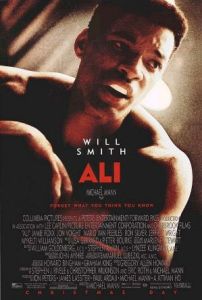 I learned a lot about Muhammad Ali in the wake of his death a few weeks back. His fighting record was stellar, and there are so many wonderful photos of Ali with other geniuses who all saw him as The Greatest, but he’s the most important sportsman of all time because he changed the game and changed the world.
I learned a lot about Muhammad Ali in the wake of his death a few weeks back. His fighting record was stellar, and there are so many wonderful photos of Ali with other geniuses who all saw him as The Greatest, but he’s the most important sportsman of all time because he changed the game and changed the world.
I perhaps learned less so watching Michael Mann’s “Ali,” a frustratingly long and meandering biopic with only some strong performances and fight cinematography to back it up.
Most biopics of this pedigree would feel the need to start in Ali’s childhood and work its way up through his late in life Parkinson’s. Mann resists that urge and focuses strictly on his time as a fighter, both in the ring and as a warrior for civil rights, his religion and the war. And yet you could make a movie that dialed closely on any one of these moments. If Malcolm X can get his own film then so can his relationship with Ali. You could make an entire Frost v. Nixon style movie based solely around Ali’s interviews with Howard Cosell. The discrepancy between their on-camera squabbles and off-camera chemistry could make a great comedy.
But by the time “Ali” arrives in Africa for the fight with George Foreman, not to mention the late-to-the-party introduction of yet another one of his wives, the compelling conflict and intricate drama of Vietnam and the Civil Rights movement feels so far in the rearview mirror. We know the outcome of the fight, and the original tension the movie spent the first hour plus establishing has vanished.
So much of “Ali” hangs on Will Smith’s charisma in the role. It’s all in the mannerisms, the footwork, the bobbing and weaving, the physicality of his performance. When he’s being interviewed you can see his dramatic shift in posture, with his legs spread wide and a new cadence and rhythm to his voice. In the more dramatic scenes its his ability to get lost in a deep stare under heavy eyebrows and a gigantic forehead. Smith just fits the part better than anyone else could, and it’s arguably his best performance.
“Ali” wouldn’t be the first biopic to have a stellar lead performance and little else going for it. I said as much about “Chaplin” just this past week. But it’s amazing how in the film’s first hour, it genuinely floats like a butterfly and stings like a bee, streamlining Ali’s life moments, his energy and his legacy all around those pivotal fights. It’s just by the end it’s moving so slowly it hardly resembles a champion.